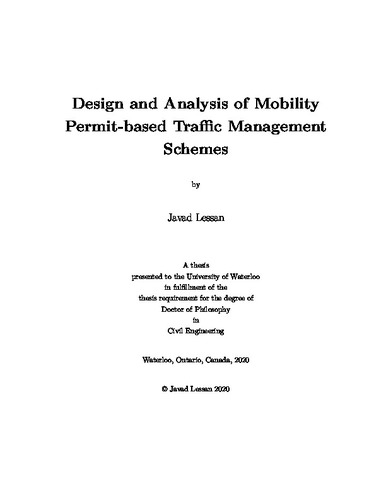| dc.description.abstract | High demand for mobility has undeniably been causing numerous negative impacts on the economy, the society and the environment. As a potential solution to address this challenge, a rapid transition is taking place in the transportation sector with emerging concepts of mobility marketplace. The basic premise is to treat the transportation system and its use as a collection of commodities or services that can be bought from the transportation market. This concept is increasingly becoming a reality with the technological developments in automotive industry such as connected and autonomous vehicles (CAVs). However, there are many policy, design and operation related issues that must be addressed before these traffic management schemes become reality. This thesis research aims at addressing some of these challenges and issues with a specific focus on the two most promising market-driven instruments, namely, mobility permits (MP)- and mobility credits (MC)-based traffic management schemes, which have been proposed to manage travel demand and mitigate traffic congestion by controlling roadway-use right.
This research has made several distinctive contributions into the literature. We first conduct a critical review of the state-of-the-art methodological advances on MP- and MC-based travel demand management schemes. We synthesize the relevant body of literature with an in-depth discussion on related studies to provide an improved understanding of the fundamental constructs of these problems, including problem variants, methodologies, and modeling attributes. We also discuss the research gaps and challenges and suggest some possible perspectives and directions for future research.
Based on the gaps identified in the literature review, an integrated framework is proposed for implementing various roadway-use right-based traffic management programs such as MP and MC-based schemes. This framework entails a unique construct for integrating the needs of multiple stakeholders (e.g., road users and authorities), diverse network conditions, and traffic control methods. It allows easy incorporation of different components required for implementing a coordinative mobility scheme, taking into account the influence of the participating players and the underlying issues. The framework can be served as a road-map to future studies on different roadway-use right-based solutions for traffic congestion management.
With our proposed framework, we then focus on addressing various specific challenges arising in designing and implementing MP-based and MC-based schemes, such as, representation of realistic user characteristics (e.g., utility function, user priorities and cooperation), availability of information on users and traffic conditions, uncertainty in system conditions and user behaviors, and circulation of mobility rights in market place. For the MP-based scheme, we focus specifically on designing a mobility scheme for single-bottleneck roadways. Roads with bridges, tunnels and business districts with limited parking spaces are the most obvious examples of a simple roadway with a single-bottleneck in a transportation network. We deal with observing operational objectives, specifically, balancing efficiency, equity (users priorities), and revenue outcome of distributing mobility permits under the “fairness” constraint. We explore the theoretical properties of the proposed scheme and show that the proposed scheme can achieve an optimal traffic pattern. Particularly, we show that the proposed scheme is a Pareto-improving and strategy-proof scheme capable of achieving efficient and effective market prices suitable for travelers. Our computational results indicate the effectiveness of the proposed scheme as an alternative solution for MP-based traffic management on single-bottleneck roadways.
We then investigate the case of traffic congestion management in a general road network through a MC-based scheme. Specifically, we propose a MC-based traffic management scheme in a road network consisting of a mixed-fleet traffic with connected and autonomous vehicles (CAVs) and conventional vehicles (non-CAVs). The basic premise of the proposed scheme is to regulate or influence travel demand and congestion with regards to the supply (capacity) of road networks, implementing a market-driven traffic management paradigm. A set of revenue-neutral, Pareto-improving MC-based charge and reward policies applicable to stochastic traffic environments are developed, considering different characteristics of users such as cooperative versus selfish routing behaviors, human-associated factors (e.g., level of uncertainty) and interactions due to a shared infrastructure setting. Path-free mathematical programming models are formulated, obviating computationally intractable path enumeration process pertinent to the existing studies. This makes the proposed scheme suitable for examining the theoretical characteristics of large-scale realistic transport networks. We examine several theoretical properties related to the proposed MC-based scheme, including the existence and uniqueness of the equilibrium price, and existence of Pareto-improving credit charges and rewards rates that can promote travel decision behaviors of individual travelers towards a network-wide optimal state. Our comprehensive computational results indicate that the proposed MC-based scheme can be an effective tool for managing travel demand and routing decisions in mixed-vehicle traffic settings. | en |

